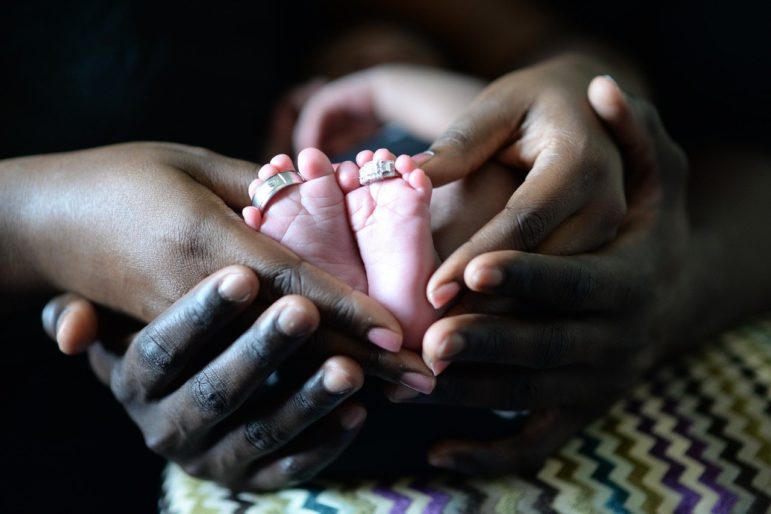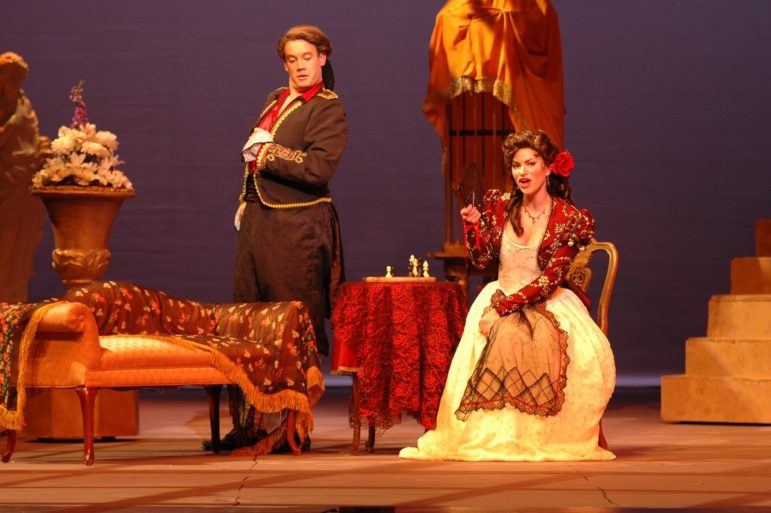
We are born in ritual, with a cry as we cross the barrier from the comfort of the womb to taking a first breath in a new space called life. We join in ritual as the individual becomes a part of a duo or family. We use ritual to formally or informally dissolve bonds made between partners. We embrace ritual in celebration as we mark educational passages. We die in ritual as we are mourned by those who bear witness that a human body has left the realm of life to what lays beyond.
Ritual forms a powerful bond during each and every step of our lives, yet the term “ritual” is too often delineated through terse categorization. During the seasonal celebration of creativity and the mid-winter sabbats, I see fire festivals, such as Brunalia, Imbolc, and Gromnitsa, as opportunities for re-assessment, re-evaluation, and reflection.

Birth – two sets of hands cradling a newborn’s feet [Pixabay]
Just like stone slabs that lay out a path in a garden, rites associated with ritual mete out steps in a process. How easy would it be to race through life in boundless motion, never stopping, and never looking to see what we are actually doing? I find myself after months of pandemic isolation reconsidering why the act and the concept of ritual is so comforting. Why does it matter what gets done in what order when waking up in the morning? Why does a day feel out of sort with a missed breakfast or a lack of coffee in the morning? Why does bathing or showering at the start of the day, at whatever time that day begins, bring a sense of things working in a right order?
The biggest insight for me from the year 2020 is the very human craving for ritual. Call it a sense of normalcy. How often have we heard the term “the new normal”? This very expression brings to light our human attempt to grapple with what is off and out of place. If “normal” means leaving the house to go to any sort of occupation, volunteer work, or school, then having a large populace staying at home registers as a shock to our conscious ideal of what life is supposed to be. The very term “new normal” provides a verbal reset to a situation. We need the rites of finding new terms so that we can go forward.
It is not normal to have parts of a society living in solitude when they are used to celebrating all sorts of rites outside of the home. The act of gathering to bring life into the world is suddenly a more solitary and sterile existence. It is more than just a pandemic. As one friend told me, she wanted all four grandparents and multiple relatives to be present for her child’s spring 2020 arrival; instead she was fortunate enough to have just her husband by her side during a time when most were denied family members in the actual hospital due to viral pandemic.
Ritual is social custom and order, so when we do not have these daily or regular ceremonies, we find life to be lacking. I have a friend whose year revolves around racing, so his year truly begins with the Daytona 500. For horse race fans, the Triple Crown reigns as a reason to gather with friends, drink, gamble, and see whose favorite horse will win. Theater and opera fans enjoy a production season that runs from fall through spring a different summer schedule. Each of these social events enjoins prescribed rites for those who want to have the whole experience, from when to get tickets, where to find the best seats, what to wear, and how to prepare.

A scene from the opera The Barber of Seville [Pixabay]
I love people watching at the opera. Living in a colder part of the country means that dressing up takes on a different meaning. During a frigid January or November, I enjoy attending in a practical long skirt, warm lined boots, and a thick sweater with similarly dressed friends. As we people watch, I love seeing women dressed in stiletto or kitten-heeled shoes, short jewel-toned satin dresses, and faux fur wraps or men who show up in formal suits or tuxedos. When I see them, my heart lights up. Given the unavoidable cold at times, it is not that they ignore the weather; in fact, they honor the rites of passage for going to the opera or the theater in spite of the weather.
Rituals provide a psychological safety. When we gather for religious purposes in our groves, circles, lodges, houses, or kindreds, we start with grounding. This is not just a physical return to the earth below, but a centering that presses the re-start button into our bodies, minds, and spirits. The length of time for the ritual doesn’t matter, but the acts of completing the steps for whatever type of ceremony environed does matter.
Everyday routine provides a nourishment or grounding because we know what to expect. If we have a workday that begins at seven when we leave the house and ends at six when we return to the house, then anything breaking this up for a long period of time depletes the grounding that we have built up over time. In some ways, this is why taking an unplanned vacation or even a planned retirement can jostle our sense of self as humans. We may say “I don’t know what to do with myself,” even though we may have planned for months or years as to what we would do “if we just had the time.”
Now we have had the time. The true test of human rites is what we chose to do with that time.
Just as we emphasize the role of intention in religious ritual, this is just as important for everyday life. During the pandemic, a lot of us had time to evaluate the cadence of our lives. What is our intent in completing actions that we do every day without much thought? This is the time when we looked at why we do what we do in our lives. Perhaps the open secret for so many of us is that the physical job is done as a means to support what we believe is our life: the cost of where we sleep, the ability to feed ourselves and our families, the way we entertain ourselves, and what we find that gives our lives meaning. For the unemployed the first three are very important because the first two are survival with the third being the glue that permits continued survival. For the last one, a lot of us searched meaning in our lives.
Perhaps the past 11 or 12 months showed how the cadence of everyday life, the rote actions that we took for granted actually were our sole actual meaning for life. When we don’t know what makes us whole internally and externally, we grasp through ritual for what will makes sense. Some found that spending too much time with loved ones elicited the desire to divorce, to quit a job that just no longer fit, or to move away a crowded city to a suburb or even the countryside. Others grew closer to partners, spouses, children, and themselves. My cousin enjoys mani-pedi Saturdays with her son while she undergoes medical treatment. While the pandemic brought him back home, the closeness resulted from time spent together that normally they would not have had.
Traditionally, parents and children spend an intense 15-18 years together with a breaking away by the children. It is a rite of passage that we celebrate with completing driver’s education in high school or later, followed later by choices to live away from home, to go to college, to build a new outside friend group, to marry, to have children, and to find a job for earning a living. Going backwards from this ritual path in the past did not bring joy, but concern or even anger that something had gone wrong with the process.
Now with the pandemic, we have to re-shape what we consider to be new societal norms. Children live with parents for many reasons, not just because it may be cheaper. Some lost jobs, while others realized that the viral cause for the pandemic was serious enough to allow a re-think of just where they wanted to be if their parents or loved ones got infected. Pandemic life did not erase dementia, the needs of the disabled, or the needs of the elderly. Pre-pandemic societal problems not only remained, but needed new solutions.
We learned to stay connected via virtual calls or chatting on the phone while walking solo in a park or near home. We hit refresh on the human need to give back by making face masks for donation, helping first responders and health care workers by providing pizza or cheering every night at 7 p.m., checking in on neighbors, and volunteering to help to keep facets of society going.
We needed to re-gain a sense of coziness with life instead of a sense of imbalance. For many, what happened blasted forth as common frustrations with prolonged virtual schooling combined with inadequate space for working from home if the employer allowed it, plus a return of adult children considered long gone. Memes, tweets, TikTok videos evolved as the new reality programming. We could not escape each other as new films debuted via streaming platforms or on cable. The ritual of leaving home for entertainment unless one could not pay for it suddenly became staying at home for paid entertainment.
Even the recent puzzle and board game craze reflects the current human need to refocus on ritual. What brings people closer than working together to put pieces into a pattern? Playing board games encourages imagination and connection whether in person or virtually. The requirement to shift from an in-person emphasis to a virtual emphasis for communication changed our expectations for this mode.
Virtual meetings have their own etiquette. Commercials make fun of now-common mistakes, such as showing that you are wearing shorts at a business meeting, or having family members or pets wander through the background during an academic class or chat with one’s boss. One coffee manufacturer changed its advertisements to highlight the societal shift to half dressing- business on top, leggings, pajamas, or even just underwear on the bottom.
New ritual practice includes reminding others to mute or unmute during conversations. We are more lenient with internet lapses and the need to refresh a browser or even re-boot a computer. Just recent generations moved from phone calls to text messages as the dominant means of conversation, getting together with older family members, loved ones in a hospital situation, or large groups may be done virtually.
We sit longer, resulting in more need to care for our backs and shoulders. Hours of screen time more than we ever envisioned mean having eye drops at the ready to soothe eyes strained from lack of sufficient blinking. We make new intentions to match the uncertainty of our current world because if we don’t we continue to wander. Our mental health in part relies upon ritual, the rites that we have taken for granted in the past because we expected life to remain as it was: predictable and sustainable.
When we have the world stripped from us, ritual allows emotions and care to sluice over us like water.

Susquehanna State Park waterfall [Derek Ramsey, CC 2.5]
Our new rituals reflect human adaptability. In the United States, the push for virtual Thanksgiving and subsequent cold-weather holidays emphasized saving the older generations from viral infection so that they could stay out of the hospitals a month or six weeks later. The clear uneven pace of fully embracing this pattern brings a reminder of human defiance and stubbornness.
In many ways, the split from pre-pandemic life allows our imagination to flow. We create new rituals – only we call them practices or habits. We change our patterns to allow new ones to form as we experiment with new family customs. The wedding with all attendees in masks except the couple to be joined seems normal. The larger question is whether the face mask color matches that of the outfit. The use of a tablet in hospitals to allow medical personnel to facilitate final farewells between the dying and family members no longer rates any surprise. Large gatherings held virtually with few persons actually physically present for any ceremony seems more normal than a year ago.
We have a human divide between those who fear the level of pre-pandemic human interaction and those who crave it. The former ways of conducting ceremonies for what we consider to be major moments for all humans such as birth, death, unions, partings, weddings, divorce, graduations, holy days now seem old. With each cycle however, our human need to normalize our daily lives through ritual provides a guide to the future: when we seek moderation, we thrive.
Humans create. We seek patterns that give meaning and resonance for our lives. We need ritual to live, to breathe, and to exist.
THE WILD HUNT ALWAYS WELCOMES GUEST SUBMISSIONS. PLEASE SEND PITCHES TO ERIC@WILDHUNT.ORG.
THE VIEWS AND OPINIONS EXPRESSED BY OUR DIVERSE PANEL OF COLUMNISTS AND GUEST WRITERS REPRESENT THE MANY DIVERGING PERSPECTIVES HELD WITHIN THE GLOBAL PAGAN, HEATHEN AND POLYTHEIST COMMUNITIES, BUT DO NOT NECESSARILY REFLECT THE VIEWS OF THE WILD HUNT INC. OR ITS MANAGEMENT.
The Wild Hunt is not responsible for links to external content.
To join a conversation on this post:
Visit our The Wild Hunt subreddit! Point your favorite browser to https://www.reddit.com/r/The_Wild_Hunt_News/, then click “JOIN”. Make sure to click the bell, too, to be notified of new articles posted to our subreddit.